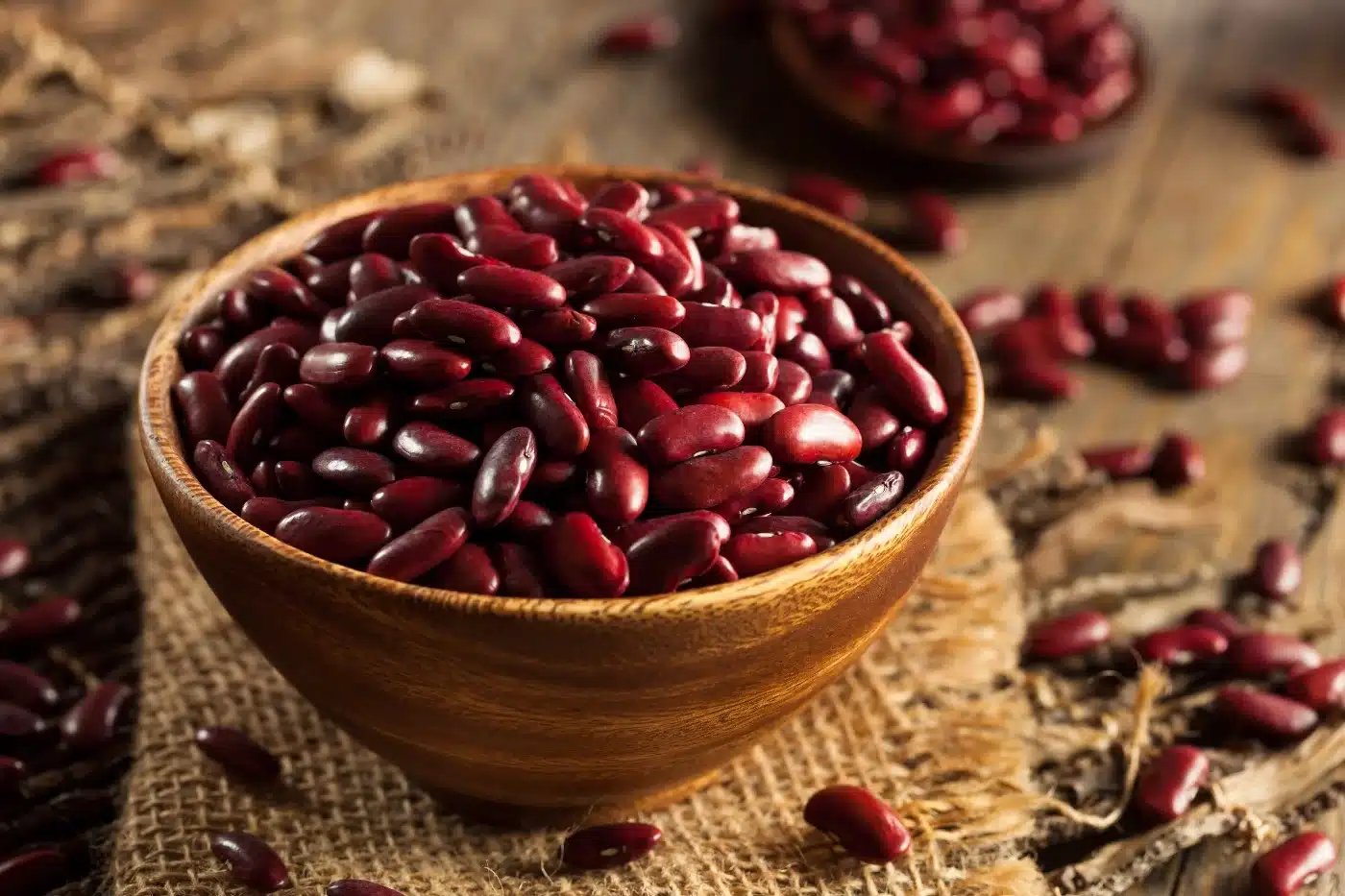Kidney beans are a nutritional powerhouse that deserves a spot in your diet.
These versatile legumes are packed with essential nutrients and offer numerous health benefits.
From aiding in weight management to promoting digestive health, kidney beans are a true superfood.
Key Takeaways
- Kidney beans are an excellent source of plant-based protein, fibre, vitamins, and minerals
- Incorporating kidney beans into your diet may help with weight loss and blood sugar control
- Regular consumption of kidney beans can promote digestive health and reduce the risk of colon cancer
You will learn about the impressive nutritional profile of kidney beans and how they can positively impact your health. Let’s start by exploring the various nutrients found in these mighty legumes.
Nutritional Profile
Kidney beans are a nutrient-dense food that can contribute to a well-balanced diet. Here’s a closer look at the macronutrients and micronutrients found in these legumes.
Macronutrients
| Nutrient | Amount per 100g (cooked) |
|---|---|
| Protein | 8.7 g |
| Carbohydrates | 22.8 g |
| Fibre | 6.4 g |
| Fat | 0.5 g |
As you can see, kidney beans are an excellent source of:
- Plant-based protein, which is essential for building and repairing tissues
- Complex carbohydrates, which provide sustained energy throughout the day
- Dietary fibre, which promotes digestive health and helps you feel full longer
Micronutrients
Kidney beans are also packed with essential vitamins and minerals, including:
- Folate (vitamin B9)
- Iron
- Copper
- Manganese
- Potassium
- Vitamin K1
These micronutrients play crucial roles in various bodily functions, such as red blood cell formation, bone health, and enzyme production.
Unique Plant Compounds
In addition to their impressive nutritional profile, kidney beans contain several unique plant compounds that offer potential health benefits:
- Isoflavones: These antioxidants, similar to the ones found in soybeans, may help reduce inflammation and improve heart health.
- Anthocyanins: Found in the skin of kidney beans, these colourful antioxidants may protect against oxidative stress and chronic diseases.
- Phytic acid: Also known as phytate, this compound may impair mineral absorption but can be reduced by soaking and sprouting the beans.
- Starch blockers: These proteins, also called alpha-amylase inhibitors, may help slow down the absorption of carbohydrates and aid in weight management.
While some of these compounds may have potential drawbacks, proper preparation methods can minimise their negative effects and enhance the overall nutritional value of kidney beans.
Health Benefits
Incorporating kidney beans into your diet can offer several impressive health benefits. Let’s explore how these legumes can positively impact your well-being.
Weight Management
Looking to manage your weight? Kidney beans can be a valuable addition to your diet. The high protein and fibre content in kidney beans can help you feel full and satisfied, reducing overall calorie intake. Plus, the slow-release carbohydrates provide sustained energy, preventing sudden spikes in blood sugar that can lead to cravings and overeating.
Blood Sugar Control
Kidney beans can be particularly beneficial for individuals looking to maintain healthy blood sugar levels. The low glycaemic index of kidney beans means they have a minimal impact on blood sugar, helping to prevent sudden spikes and crashes. Regular consumption of low-glycaemic foods like kidney beans may reduce the risk of developing type 2 diabetes and improve overall blood sugar control.
Digestive Health
Want to promote digestive health and reduce disease risk? Kidney beans can play a crucial role. The high fibre content helps promote regular bowel movements and prevents constipation. Fermentable fibres in kidney beans also act as prebiotics, feeding the beneficial bacteria in your gut and promoting a healthy microbiome. Some studies even suggest that regular consumption of legumes like kidney beans may reduce the risk of colon cancer.
Potential Drawbacks and Proper Preparation
While kidney beans offer numerous health benefits, it’s essential to be aware of some potential drawbacks and take appropriate measures to minimise risks.
- Raw kidney bean toxicity: Raw or improperly cooked kidney beans contain high levels of phytohaemagglutinin, a toxic protein that can cause severe digestive issues. Always ensure kidney beans are thoroughly cooked before consumption.
- Digestive discomfort: Some individuals may experience bloating, flatulence, or diarrhoea after consuming kidney beans due to their high fibre content and the presence of certain indigestible carbohydrates (oligosaccharides).
To maximise the nutritional benefits of kidney beans and minimise potential drawbacks, it’s crucial to prepare them properly:
- Soaking: Soak dried kidney beans in water for at least 5 hours or overnight to reduce cooking time and improve digestibility.
- Cooking: Boil kidney beans for at least 10 minutes at 100°C to destroy the toxic phytohaemagglutinin protein. Ensure they are fully cooked and tender before consumption.
By following these preparation methods, you can safely enjoy the numerous health benefits kidney beans have to offer.
A Nutritional Powerhouse
In conclusion, kidney beans are a true superfood that deserves a regular spot in your diet. With their impressive nutritional profile, unique plant compounds, and numerous health benefits, these mighty legumes can help you achieve your wellness goals.
From promoting weight management and blood sugar control to supporting digestive health and reducing disease risk, kidney beans offer a wide range of advantages. By properly preparing and incorporating them into your meals, you can safely enjoy the many benefits these nutritional powerhouses have to offer.
So, next time you’re looking for a delicious and nutritious addition to your plate, remember to reach for a serving of kidney beans. Your body will thank you!
